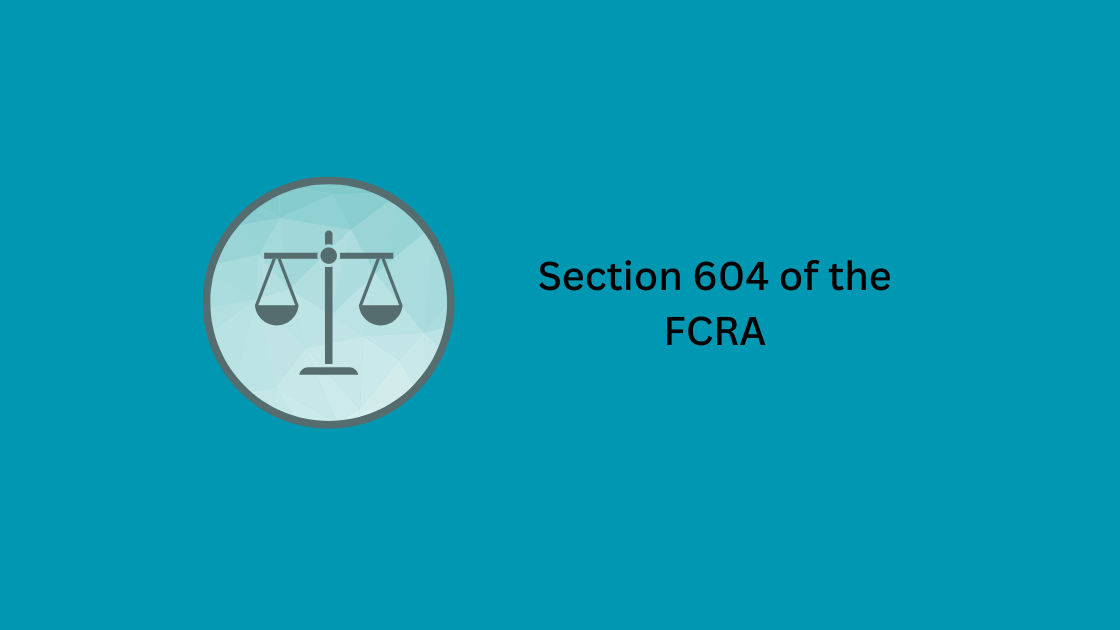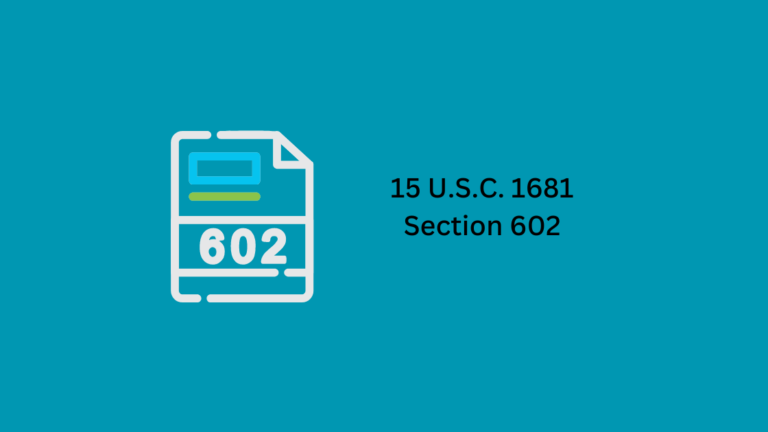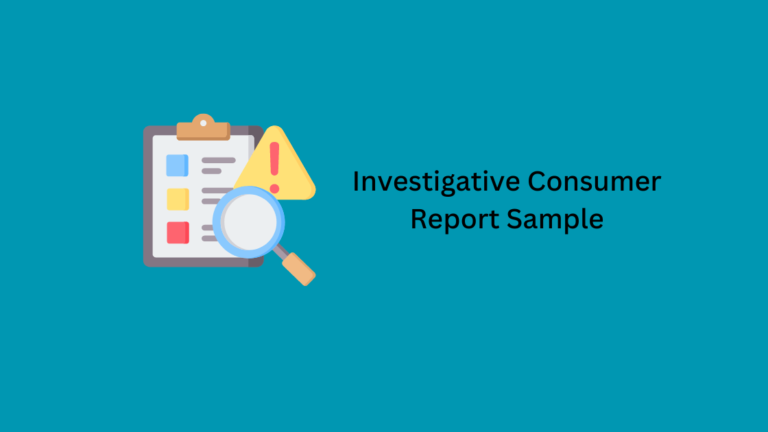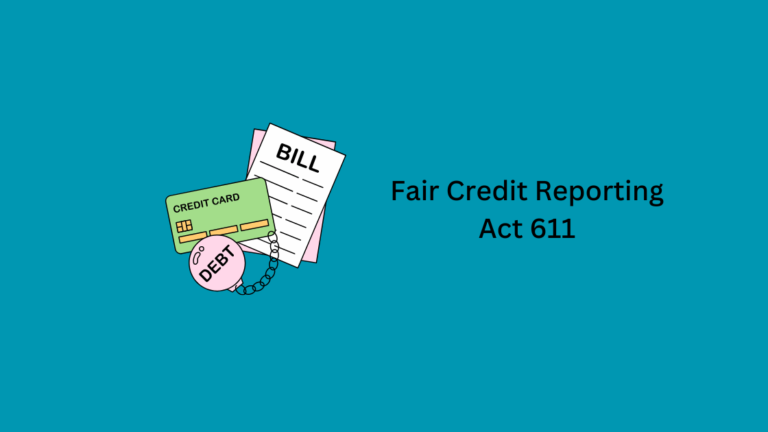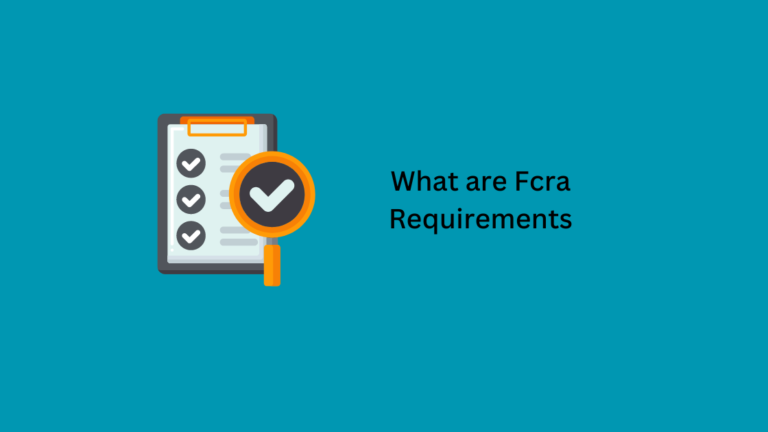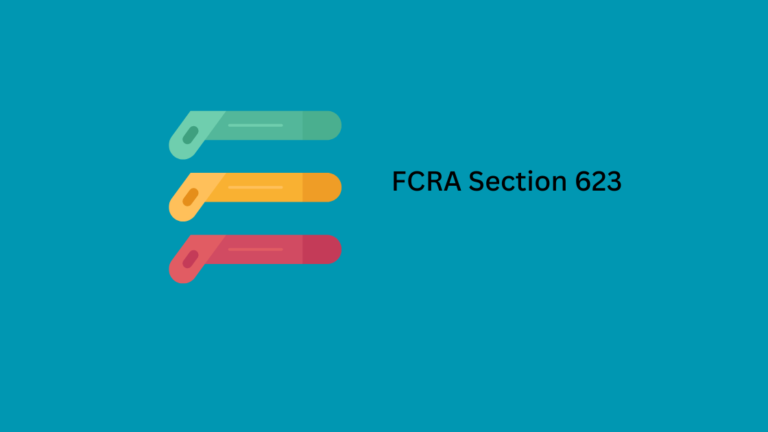Section 604 of the FCRA: Understanding Your Consumer Rights
Section 604 of the FCRA specifies the permissible purposes for obtaining a consumer report. These purposes include credit transactions, employment, insurance, and other legitimate business needs.
Section 604 of the Fair Credit Reporting Act (FCRA) plays a crucial role in regulating access to consumer reports. It outlines the specific conditions under which consumer information can be legally obtained. Credit transactions, employment considerations, and insurance underwriting are some of the primary scenarios covered.
Businesses must adhere to these guidelines to ensure compliance and protect consumer privacy. Understanding these provisions helps both consumers and businesses navigate the complexities of consumer reporting. This section aims to balance the need for information with the right to privacy, ensuring fair and responsible use of consumer data.

Credit: www.self.inc
Introduction To FCRA
The Fair Credit Reporting Act (FCRA) is a vital law in the United States. It ensures accuracy and privacy in consumer credit information. Understanding Section 604 of the FCRA is important for everyone.
What Is FCRA?
The FCRA is a federal law. It was enacted in 1970. The main goal is to protect consumer information. It regulates the collection, dissemination, and use of consumer information. The FCRA is enforced by the Federal Trade Commission (FTC).
Purpose And Importance
The purpose of the FCRA is to ensure fair and accurate credit reporting. It gives consumers the right to access their credit reports. It allows them to dispute incorrect information.
- Consumer Protection: The FCRA safeguards consumer information.
- Accuracy: It ensures that credit reports are accurate.
- Privacy: It controls who can access your credit information.
These protections are crucial. They impact your financial health. They help you get loans, mortgages, and jobs.
| Aspect | Description |
|---|---|
| Consumer Rights | Access to credit reports and dispute inaccuracies. |
| Accuracy | Ensures correct information in credit reports. |
| Privacy | Limits who can access your credit information. |
Key Provisions Of Section 604
Section 604 of the Fair Credit Reporting Act (FCRA) outlines the rules for accessing consumer credit reports. It ensures that reports are only used for specific and legitimate purposes. This section protects consumer privacy and maintains the integrity of credit information.
Permissible Purposes
Section 604 lists the permissible purposes for which consumer reports can be accessed. These purposes include:
- Credit transactions
- Employment screening
- Insurance underwriting
- Government licenses
Only authorized parties can access your credit report. Unauthorized access is a violation of the FCRA.
Consumer Consent
Consumer consent is crucial under Section 604. Before accessing a credit report, the requesting party must obtain the consumer’s written permission. This rule ensures that consumers are aware of who is viewing their credit information.
Employers, in particular, must follow strict guidelines. They need explicit consent from job applicants before performing credit checks. This practice helps protect job seekers’ privacy.
Who Can Access Your Credit Report?
Your credit report contains sensitive information. It’s crucial to know who can access it. Under Section 604 of the FCRA, only certain parties have this right.
Creditors And Lenders
Creditors and lenders can access your credit report. They use it to evaluate your creditworthiness. This helps them decide if they should approve your loan or credit card application.
- Banks
- Credit unions
- Mortgage companies
They check your credit history before lending you money. A good report increases your chances of approval. They also determine your interest rates based on your credit score.
Employers And Landlords
Employers and landlords may also check your credit report. They do this to assess your financial responsibility.
| Employers | Landlords |
|---|---|
| Check credit for hiring decisions | Check credit before renting property |
| Need your written consent | Review payment history |
Employers need your permission to access your report. Landlords review it to ensure you can pay rent on time. Good credit may help you secure a job or a rental home.

Credit: www.uslegalforms.com
Consumer Rights Under Section 604
Section 604 of the Fair Credit Reporting Act (FCRA) protects consumer rights. This section ensures that your personal information is safe. It also guarantees transparency in how your data is used.
Right To Privacy
Your right to privacy is crucial under Section 604. Only certain people can access your credit report. These include lenders, employers, and insurance companies. They need a valid reason to view your credit information. Unauthorized access is strictly prohibited.
Section 604 also requires these entities to have your permission. For example, an employer must get your written consent before checking your credit. This rule helps keep your personal information private and secure.
Right To Disclosure
The right to disclosure means you can see who has accessed your credit report. You have the right to know why your credit was checked. This transparency helps you understand your credit activity.
You can request a list of entities that have viewed your credit report. This list will show the date and reason for each inquiry. Knowing this information helps you spot any unauthorized access quickly.
Section 604 also gives you the right to dispute incorrect information. If you find an error, you can challenge it. The credit bureau must investigate and correct any mistakes. This process ensures your credit report is accurate.
| Consumer Right | Description |
|---|---|
| Right to Privacy | Limits who can access your credit report. |
| Right to Disclosure | Allows you to see who accessed your credit report and why. |
- Privacy Protection: Keeps your personal info safe.
- Transparency: Ensures you know who checks your credit.
- Accuracy: Lets you correct mistakes in your report.
Understanding your rights under Section 604 is vital. It helps you protect your credit and personal information.
Steps To Protect Your Credit Information
Section 604 of the Fair Credit Reporting Act (FCRA) plays a crucial role in protecting your credit information. Understanding the steps to safeguard your credit can help you avoid identity theft and maintain a healthy financial profile. Here, we outline essential steps to protect your credit information.
Monitoring Your Credit Report
Regularly monitoring your credit report is vital. You can spot errors and unauthorized activities by checking your report often. Here are some key actions to take:
- Request a free credit report from major credit bureaus annually.
- Review your report for inaccuracies and fraudulent activities.
- Dispute any errors immediately with the credit bureau.
Use a credit monitoring service for real-time alerts on changes. This service can help you stay informed about any suspicious activity.
Placing A Security Freeze
A security freeze prevents new creditors from accessing your credit report. This step can stop identity thieves from opening new accounts in your name. Follow these simple steps to place a security freeze:
- Contact each major credit bureau: Equifax, Experian, and TransUnion.
- Provide necessary personal information for verification.
- Request the security freeze online, by phone, or by mail.
- Receive a PIN or password to lift the freeze when needed.
Remember, a security freeze does not affect your existing accounts. You can still use your credit cards and other financial services.
By implementing these steps, you can effectively protect your credit information and maintain financial security.
Dealing With Unauthorized Access
Section 604 of the FCRA protects your credit report. Unauthorized access to your credit information is a serious issue. You need to deal with it quickly and efficiently. Let’s explore how to handle unauthorized access.
Identifying Unauthorized Inquiries
First, review your credit report regularly. Look for any suspicious entries. Unauthorized inquiries can hurt your credit score. They often indicate identity theft or fraud.
- Check for names you don’t recognize.
- Look for inquiries from unfamiliar companies.
- Note any inquiries you didn’t authorize.
Keep a list of these unauthorized inquiries. This will help you in the next steps.
Filing A Dispute
Once you identify unauthorized inquiries, file a dispute. You can dispute online or by mail. Follow these steps:
- Contact the credit bureau: Inform them about the unauthorized inquiry.
- Provide evidence: Include copies of your credit report with the unauthorized inquiries highlighted.
- Write a dispute letter: Clearly state that you did not authorize these inquiries.
Use the sample table below for your dispute letter.
| Step | Description |
|---|---|
| 1 | Contact the credit bureau. |
| 2 | Provide evidence of unauthorized inquiries. |
| 3 | Write a clear dispute letter. |
Follow up with the credit bureau until they remove the unauthorized inquiries. Keep records of all your communications.
Impact Of Section 604 On Credit Scores
Section 604 of the Fair Credit Reporting Act (FCRA) significantly affects credit scores. It governs how credit inquiries are handled. Understanding this section helps manage and improve credit health.
Soft Vs. Hard Inquiries
Credit inquiries fall into two categories: soft inquiries and hard inquiries. Each type impacts your credit score differently.
- Soft Inquiries: These do not affect your credit score. They occur when you check your own credit, or when a lender pre-approves you.
- Hard Inquiries: These can lower your credit score. They happen when you apply for new credit, like loans or credit cards.
Hard inquiries stay on your credit report for two years. Multiple hard inquiries in a short time can significantly lower your score.
Mitigating Negative Effects
To reduce the negative impact of hard inquiries, follow these steps:
- Limit the number of new credit applications. Apply only when necessary.
- Monitor your credit regularly. Use free credit report services to stay informed.
- Keep old accounts open. The length of your credit history matters.
- Pay your bills on time. Payment history is a major factor in credit scores.
Maintaining good credit habits can help mitigate the negative effects of hard inquiries. Always be mindful of your credit actions.
Legal Recourse For Violations
Section 604 of the Fair Credit Reporting Act (FCRA) outlines how consumer information can be used. When this section is violated, consumers have legal options to address these issues. This section provides a roadmap for consumers to seek justice.
Filing Complaints
If you suspect a violation of Section 604, you can file a complaint. The first step is to gather evidence. This can include credit reports, correspondence, and any other relevant documents.
Next, you should file a complaint with the Consumer Financial Protection Bureau (CFPB). You can submit your complaint online through the CFPB’s website. Make sure to include all necessary details and evidence.
Another option is to file a complaint with the Federal Trade Commission (FTC). The FTC can investigate your complaint and take action if necessary.
Seeking Legal Advice
If filing a complaint does not resolve your issue, consider seeking legal advice. An attorney specializing in FCRA violations can guide you through the process. They can help you understand your rights and the best course of action.
Consulting an attorney may lead to filing a lawsuit. This can result in monetary damages and other remedies. Your attorney can represent you in court and negotiate settlements on your behalf.
Remember, there are time limits for filing lawsuits under the FCRA. It’s crucial to act quickly to protect your rights.
Tips For Maintaining Good Credit
Maintaining good credit is crucial for financial health. Follow these tips to keep your credit score high and secure your financial future.
Regularly Review Reports
Check your credit reports often. This helps catch errors quickly. You can get free reports from credit bureaus. Look at details like account balances and payment history.
- Review your report every few months.
- Check for any unfamiliar accounts.
- Report mistakes to the credit bureau.
Understand Your Rights
Know your rights under the FCRA. This act helps protect your information. You have the right to dispute errors. Credit bureaus must correct them.
- Read the FCRA guidelines.
- Understand how to dispute errors.
- Know the time limits for reporting.
Credit: www.self.inc
Frequently Asked Questions
1. What Is Section 604’s Permissible Purpose?
Section 604 permissible purpose defines the legal reasons for accessing a consumer’s credit report. These include credit transactions, employment, insurance underwriting, and other legitimate business needs.
2. What Is A 604 Dispute Letter?
A 604 dispute letter challenges inaccurate information on your credit report. It cites Section 604 of the Fair Credit Reporting Act (FCRA). This letter requests validation of the data reported by credit bureaus. Accurate reporting can improve your credit score.
3. What Is A 604 Report?
A 604 report is a credit report dispute letter. It requests the removal of inaccurate information from your credit report.
4. What Is A Permissible Purpose For A Background Check?
A permissible purpose for a background check includes employment, tenant screening, credit evaluation, insurance underwriting, and legal investigations.
Conclusion
Understanding Section 604 of the FCRA is crucial for managing your credit report. Stay informed to protect your financial health. Regularly check your credit report to ensure accuracy. Knowing your rights helps you maintain good credit standing. Make sure to utilize this knowledge for better financial decisions.

